Every year a new class of cardinals, that seems to be the tradition under Pope Francis. For this year, he calls in fourteen new members of the College, eleven of whom are able to vote in a conclave to elect his successor. This would bring the total number of electors up to 126, were it not for the ageing out of Cardinal Angelo Amato three weeks before the consistory, scheduled for 29 June. Still, the number of electors will be 5 above the maximum number established by soon-to-be Saint Paul VI, but, as noted before, this is a flexible rule that popes are free to break. Barring any deaths, the maximum number of 120 cardinal electors will again be reached by 31 July 2019.
The 2018 class of cardinals, as said, consists of 14 members from 11 different countries, all of which have had cardinals before. This may make the list less exotic than previous editions, although some of the new cardinals come from dioceses or curial departments which have never had red hats before.
Three of the new cardinals work in the curia, while the rest comes from dioceses (and one religious order) across the world. Three come from Italy, two from Spain, and one each from Iraq, Poland, Pakistan, Portugal, Peru, Madagascar, Japan, Mexico and Bolivia.
The list:
 Louis Raphael I Cardinal Sako, Cardinal-Bishop, Patriach of Babylon (Chaldean), Iraq. The second Patriarch of Babylon to be made a cardinal, and also the second Iraqi prelate. 69-year-old Patriarch Sako was appointed to Babylon and the leadership of the Chaldean Church in 2013. Before that he was the Metropolitan Archbishop of Kirkuk. As an eastern Patriarch, Cardinal Sako will automatically be a cardinal-bishop, but as a member of a non-Roman Catholic Church, albeit one in union with Rome, he will not be given a title church.
Louis Raphael I Cardinal Sako, Cardinal-Bishop, Patriach of Babylon (Chaldean), Iraq. The second Patriarch of Babylon to be made a cardinal, and also the second Iraqi prelate. 69-year-old Patriarch Sako was appointed to Babylon and the leadership of the Chaldean Church in 2013. Before that he was the Metropolitan Archbishop of Kirkuk. As an eastern Patriarch, Cardinal Sako will automatically be a cardinal-bishop, but as a member of a non-Roman Catholic Church, albeit one in union with Rome, he will not be given a title church.
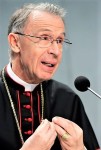 Luis Francisco Cardinal Ferrer, Cardinal-Deacon, Prefect of the Congregation for the Doctrine of the Faith. Ever since the popes ceased to head the chief office in the curia themselves, its prefects have been made cardinals. 74-year-old Spanish Jesuit Ladaria Ferrer, formerly the second in command under Cardinal Müller, receives the red hat a year after being made prefect.
Luis Francisco Cardinal Ferrer, Cardinal-Deacon, Prefect of the Congregation for the Doctrine of the Faith. Ever since the popes ceased to head the chief office in the curia themselves, its prefects have been made cardinals. 74-year-old Spanish Jesuit Ladaria Ferrer, formerly the second in command under Cardinal Müller, receives the red hat a year after being made prefect.
 Angelo Cardinal de Donatis, Cardinal-Priest, Vicar General of Rome. Another almost automatic red hat, even under Pope Francis, goes to the vicar general for the vicariate of Rome. The 64-year-old is the second cardinal in the Roman archdiocese, joining Cardinal Angelo Comastri, the vicar general for Vatican City.
Angelo Cardinal de Donatis, Cardinal-Priest, Vicar General of Rome. Another almost automatic red hat, even under Pope Francis, goes to the vicar general for the vicariate of Rome. The 64-year-old is the second cardinal in the Roman archdiocese, joining Cardinal Angelo Comastri, the vicar general for Vatican City.
 Giovanni Angelo Cardinal Becciu, Cardinal-Deacon, Substitute of the Secretariat of State. All of Cardinal-elect Becciu’s predecessors have been made cardinals, but none while serving as subsistutes in the Secretariat of State. The general expectation is that the 69-year-old Italian will also leave that office soon: he may well suceed Cardinal Angelo Amato, who will turn 80 in June, at the head of the Congregation for the Causes of Saints.
Giovanni Angelo Cardinal Becciu, Cardinal-Deacon, Substitute of the Secretariat of State. All of Cardinal-elect Becciu’s predecessors have been made cardinals, but none while serving as subsistutes in the Secretariat of State. The general expectation is that the 69-year-old Italian will also leave that office soon: he may well suceed Cardinal Angelo Amato, who will turn 80 in June, at the head of the Congregation for the Causes of Saints.
 Konrad Cardinal Krajewski, Cardinal-Deacon, Almoner of the Office of Papal Charities. Without doubt the highest-regarded curial official in Francis’ Rome, the 54-year-old Polish almoner runs the charitable initiatives on behalf of the pope in Rome. Under his responsibility, showers and barber facilities for homeless have been installed in the colonnades of St. Peter’s Square, to name but one example. Cardinal-elect Krajewski is the first papal almoner to be made a cardinal.
Konrad Cardinal Krajewski, Cardinal-Deacon, Almoner of the Office of Papal Charities. Without doubt the highest-regarded curial official in Francis’ Rome, the 54-year-old Polish almoner runs the charitable initiatives on behalf of the pope in Rome. Under his responsibility, showers and barber facilities for homeless have been installed in the colonnades of St. Peter’s Square, to name but one example. Cardinal-elect Krajewski is the first papal almoner to be made a cardinal.
 Joseph Cardinal Coutts, Cardinal-Priest, Archbishop of Karachi, Pakistan. The second Pakistani cardinal, and the first native of that country to receive the red hat, ever. Cardinal-elect Coutts, 72, has been in the country’s southern metropolis since 2012, following stints in the dioceses of Hyderabad and Faisalabad. His election must be seen in the first place as a sign of support for the small Catholic presence in a largely Muslim country.
Joseph Cardinal Coutts, Cardinal-Priest, Archbishop of Karachi, Pakistan. The second Pakistani cardinal, and the first native of that country to receive the red hat, ever. Cardinal-elect Coutts, 72, has been in the country’s southern metropolis since 2012, following stints in the dioceses of Hyderabad and Faisalabad. His election must be seen in the first place as a sign of support for the small Catholic presence in a largely Muslim country.
 António Augusto Cardinal dos Santos Marto, Cardinal-Priest, Bishop of Leiria-Fátima, Portugal. It is not the first time that Francis creates a cardinal in a country he has previously visited. The bishop of the diocese which includes the major Marian shrine of Portugal and beyond hosted the pope in May of 2017. The 71-year cardinal-elect also serves as vice-president of the Portuguese bishops’ conference and becomes that country’s second cardinal.
António Augusto Cardinal dos Santos Marto, Cardinal-Priest, Bishop of Leiria-Fátima, Portugal. It is not the first time that Francis creates a cardinal in a country he has previously visited. The bishop of the diocese which includes the major Marian shrine of Portugal and beyond hosted the pope in May of 2017. The 71-year cardinal-elect also serves as vice-president of the Portuguese bishops’ conference and becomes that country’s second cardinal.
 Pedro Ricardo Cardinal Barreto Jimeno, Cardinal-Priest, Archbishop of Huancayo, Peru. In January of this year, Pope Francis visited Peru, so that country also gets a cardinal. The 74-year-old archbishop of Huancayo joins the archbishop of the nation’s capital and is, like him, close to retirement. The cardinal-elect is the second Jesuit to be named in the current batch.
Pedro Ricardo Cardinal Barreto Jimeno, Cardinal-Priest, Archbishop of Huancayo, Peru. In January of this year, Pope Francis visited Peru, so that country also gets a cardinal. The 74-year-old archbishop of Huancayo joins the archbishop of the nation’s capital and is, like him, close to retirement. The cardinal-elect is the second Jesuit to be named in the current batch.
 Désiré Cardinal Tsarahazana, Cardinal-Priest, Archbishop of Toamasina, Madagascar. After eight years, Madagascar gets a cardinal again, although he is not the archbishop of the capital, Antananarivo. Instead, tnhe 63-year-old cardinal-designate comes from the coastal see of Toamasina. He is the first archbishop of that see, after is was raised to that status in 2010, and he also serves as president of the Malagassy bishops’ conference.
Désiré Cardinal Tsarahazana, Cardinal-Priest, Archbishop of Toamasina, Madagascar. After eight years, Madagascar gets a cardinal again, although he is not the archbishop of the capital, Antananarivo. Instead, tnhe 63-year-old cardinal-designate comes from the coastal see of Toamasina. He is the first archbishop of that see, after is was raised to that status in 2010, and he also serves as president of the Malagassy bishops’ conference.

Giuseppe Cardinal Petrocchi, Cardinal-Priest, Archbishop of L’Aquila, Italy. In Italy’s mountaineous and earthquake-stricken region of L’Aquila since 2013, the 69-year-old cardinal-elect has been unavoidably involved with missions of charity and works of mercy. The first cardinal from that see, the appointment once more overlooks such ‘autmoatic’ cardinalatial sees like Venice, Turin and Milan.
 Thomas Aquino Manyo Cardinal Maeda, Cardinal-Priest, Archbishop of Osaka, Japan. Japan was long overdue for a cardinal, and this appointment as not as unique as may be expected. Previous Japanese cardinals came from Tokyo twice, but also one time each from Nagasaki and Osaka. The appointment of the 69-year-old archbishop, who has been in office since 2014, is once more a sign of support for a small Asian Catholic congregation.
Thomas Aquino Manyo Cardinal Maeda, Cardinal-Priest, Archbishop of Osaka, Japan. Japan was long overdue for a cardinal, and this appointment as not as unique as may be expected. Previous Japanese cardinals came from Tokyo twice, but also one time each from Nagasaki and Osaka. The appointment of the 69-year-old archbishop, who has been in office since 2014, is once more a sign of support for a small Asian Catholic congregation.
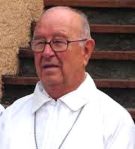 Sergio Cardinal Obeso Rivera, Cardinal-Priest, Archbishop emeritus of Jalapa, Mexico. There’s always a Mexican among Francis’ appointments, it seems, but this time the choice has fallen on an archbishop who has retired since 2007. The 86-year-old’s election is one of honour, then, perhaps in part because of his two presidencies of the Mexican bishops’ conference.
Sergio Cardinal Obeso Rivera, Cardinal-Priest, Archbishop emeritus of Jalapa, Mexico. There’s always a Mexican among Francis’ appointments, it seems, but this time the choice has fallen on an archbishop who has retired since 2007. The 86-year-old’s election is one of honour, then, perhaps in part because of his two presidencies of the Mexican bishops’ conference.
 Toribio Cardinal Ticona Porco, Cardinal-Priest, Prelate emeritus of Corocoro, Bolivia. The 81-year-old retired prelate of a small mountain mining town could be said to have truly served on the fringes of the Catholic Church. The economy in the area has been stagnant since 1985, and the new cardinal has worked here for 20 years. He is the third Bolivian cardinal and the first not to come from one of the nation’s two capitals.
Toribio Cardinal Ticona Porco, Cardinal-Priest, Prelate emeritus of Corocoro, Bolivia. The 81-year-old retired prelate of a small mountain mining town could be said to have truly served on the fringes of the Catholic Church. The economy in the area has been stagnant since 1985, and the new cardinal has worked here for 20 years. He is the third Bolivian cardinal and the first not to come from one of the nation’s two capitals.
 Aquilino Cardinal Bocos Merino, Cardinal-Deacon, Superior General emeritus of the Missionary Sons of the Immaculate Heart of Mary. Pope Francis places great value and emphasis on religious life, so in that sense it is odd that he names only three religious cardinals this time around. Perhaps he tries to balance that with the appointment of the 80-year-old Spanish Claretian who headed his order from 1991 to 2003. The order has produced four other cardinals, two of whom are still alive. It is f
Aquilino Cardinal Bocos Merino, Cardinal-Deacon, Superior General emeritus of the Missionary Sons of the Immaculate Heart of Mary. Pope Francis places great value and emphasis on religious life, so in that sense it is odd that he names only three religious cardinals this time around. Perhaps he tries to balance that with the appointment of the 80-year-old Spanish Claretian who headed his order from 1991 to 2003. The order has produced four other cardinals, two of whom are still alive. It is f
By the time of the consistory, Pope Francis will have created almost half of the electors, or active members of the College of Cardinals. He will have created 59 of them, while 47 will have been created by Pope emeritus Benedict XVI and a further 19 by Pope Saint John Paul II.
With the new consistory, Italy remains over-represented in the College, with 22 electors. It is followed by the United States with 10, Spain, France and Pland with 5, and Mexico, Brazil and India with 4 electors each. All other countries are represented by 2 or less cardinal electors.
Other changes
Before yesterdays’ announcement of the upcoming consistory, another change took place in the College of Cardinals, albeit an expected one. Ten years after being created, a cardinal-deacon can opt to be elevated to the next rank of cardinal-priest. This changes nothing in their hands, but only in their precedence among the other cardinals and thus their duties at a conclave to elect a new pope.
All six cardinal-deacons who were created by Pope Benedict XVI in 2007 accepted this change and became cardinal-priests, thus joining the other 11 surviving cardinal of their consistory, rising in precedence from after the most recently-created cardinal-priests of Pope Francis, to roughly the middle section of the cardinal-priests.
These six cardinals, who all kept their title churches pro hac vice (“for this time”, ie. for the duration of their being cardinals, which is usually until death) are:
- Leonardo Cardinal Sandri, Prefect of the Congregation for Oriental Churches and Grand Chancellor of the Pontifical Oriental Institute
- Paul Josef Cardinal Cordes, President emeritus of the Pontifical Council “Cor Unum”
- Angelo Cardinal Comastri, President of the Fabric of St. Peter, Archpriest of St. Peter’s Basilica and Vicar General for the Vatican City State
- Raffaele Cardinal Farina, Archivist emeritus of the Vatican Secret Archives, Librarian emeritus of the Vatican Apostolic Library and President emeritus of the Pontifical Commission for Reference on the Institute for Works of Religion
- Giovanni Cardinal Lajolo, President emeritus of the Pontifical Commission for the Vatican City State and President of the Governorate of the Vatican City State
- Stanislaw Cardinal Rylko, Archpriest of the Papal Basilica of St. Mary Major
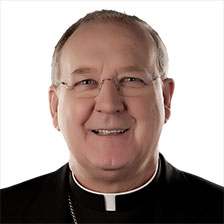 The new Dicastery for the Laity, the Family and Life is unusual in several ways. Although it succeeds two pontifical councils, it is itself not one. Neither is it that other type of curial office, a congregation. It is officially branded a dicastery, which is pretty general: both a pontifical council and a congregation are dicasteries, which is simply a term to describe a department of the curia. It is, however, to be lead by a prefect instead of a president. Prefects normally lead congregations, while presidents head pontifical councils. And prefects and presidents are usually made archbishops, but the new head of the dicastery simply remains Bishop Kevin Joseph Farrell.
The new Dicastery for the Laity, the Family and Life is unusual in several ways. Although it succeeds two pontifical councils, it is itself not one. Neither is it that other type of curial office, a congregation. It is officially branded a dicastery, which is pretty general: both a pontifical council and a congregation are dicasteries, which is simply a term to describe a department of the curia. It is, however, to be lead by a prefect instead of a president. Prefects normally lead congregations, while presidents head pontifical councils. And prefects and presidents are usually made archbishops, but the new head of the dicastery simply remains Bishop Kevin Joseph Farrell.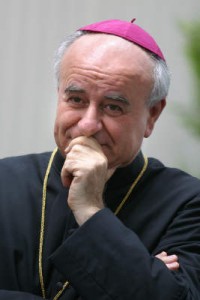 In picking the now-emeritus Bishop of Dallas, Pope Francis made a choice from outside the Roman curia. There were several options in Rome, in the first place, the heads of the suppressed pontifical councils: Cardinal Stanislaw Rylko of Laity and Archbishop Vincenzo Paglia of Family. But the former remains without a new appointment for now, while the latter moves to the third body that was expected to be merged into the new dicastery: Archbishop Paglia (at left) becomes the new president of the Pontifical Academy for Life as well as Grand Chancellor of the Pontifical Institute “John Paul II” for the study of marriage and family. Both are duties not entirely unrelated to his previous work as president of the Pontifical Academy for the Family, although they are more academical.
In picking the now-emeritus Bishop of Dallas, Pope Francis made a choice from outside the Roman curia. There were several options in Rome, in the first place, the heads of the suppressed pontifical councils: Cardinal Stanislaw Rylko of Laity and Archbishop Vincenzo Paglia of Family. But the former remains without a new appointment for now, while the latter moves to the third body that was expected to be merged into the new dicastery: Archbishop Paglia (at left) becomes the new president of the Pontifical Academy for Life as well as Grand Chancellor of the Pontifical Institute “John Paul II” for the study of marriage and family. Both are duties not entirely unrelated to his previous work as president of the Pontifical Academy for the Family, although they are more academical. The Pontifical Council for the Laity is currently led by Cardinal Stanislaw Rylko, with Bishop Josef Clemens (pictured) as secretary. At 70 and 68 respectively, neither of these are about to retire, so if they do not remain in the dicastery, new appointments will have to be sought for them. Bishop Clemens is especially interesting, as the choice may be made to send him home to a diocese in Germany. At 68, he would be a transitional bishop, which would not go down well in the eastern German dioceses (of which Dresden-Meißen is vacant), where bishops have
The Pontifical Council for the Laity is currently led by Cardinal Stanislaw Rylko, with Bishop Josef Clemens (pictured) as secretary. At 70 and 68 respectively, neither of these are about to retire, so if they do not remain in the dicastery, new appointments will have to be sought for them. Bishop Clemens is especially interesting, as the choice may be made to send him home to a diocese in Germany. At 68, he would be a transitional bishop, which would not go down well in the eastern German dioceses (of which Dresden-Meißen is vacant), where bishops have 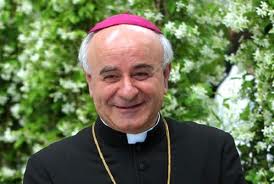 The Pontifical Council for the Family is led by Archbishop
The Pontifical Council for the Family is led by Archbishop  There are persistent rumours that the reforms of the Roman Curia will soon enter a new phase as several councils will be merged into two congregations. And the preliminary steps for the new phase have already been taken in recent months.
There are persistent rumours that the reforms of the Roman Curia will soon enter a new phase as several councils will be merged into two congregations. And the preliminary steps for the new phase have already been taken in recent months. Cardinal Sarah and Bishop Toso have been reassigned, but that leaves several other prelates without a clear place to go. For now at least. Candidates for the position of Prefect of the new congregation would, in my opinion, be Cardinal Peter Turkson (pictured), who now heads the Pontifical Council for Justice and Peace, or possibly Archbishop Zygmunt Zimowski, who is now the president of the Health Care council. Both are about the same age (Turkson is 66, Zimowski 65) and about the same number of years in the Curia behind them. The other option for both of them is a return to their native country, something that Pope Francis seems to prefer. In Ghana, Cardinal Turkson’s native country, the only vaguely likely option is a return to the Archdiocese of Cape Coast, where he was archbishop from 1992 to 2009. Cape Coast’s current Archbishop, Matthias Nketsiah, turns 75 in 2017. Not a very likely prospect, in my opinion.
Cardinal Sarah and Bishop Toso have been reassigned, but that leaves several other prelates without a clear place to go. For now at least. Candidates for the position of Prefect of the new congregation would, in my opinion, be Cardinal Peter Turkson (pictured), who now heads the Pontifical Council for Justice and Peace, or possibly Archbishop Zygmunt Zimowski, who is now the president of the Health Care council. Both are about the same age (Turkson is 66, Zimowski 65) and about the same number of years in the Curia behind them. The other option for both of them is a return to their native country, something that Pope Francis seems to prefer. In Ghana, Cardinal Turkson’s native country, the only vaguely likely option is a return to the Archdiocese of Cape Coast, where he was archbishop from 1992 to 2009. Cape Coast’s current Archbishop, Matthias Nketsiah, turns 75 in 2017. Not a very likely prospect, in my opinion. In Poland, where Archbishop Zimowski (pictured) comes from, there is the enticing option of Kraków, which should become vacant very soon. Cardinal Dziwisz, the current archbishop there, turns 76 in April. Solely judging from these options, Cardinal Turkson would seem to be more likely to remain in Rome and head a new Congregation for Justice and Peace.
In Poland, where Archbishop Zimowski (pictured) comes from, there is the enticing option of Kraków, which should become vacant very soon. Cardinal Dziwisz, the current archbishop there, turns 76 in April. Solely judging from these options, Cardinal Turkson would seem to be more likely to remain in Rome and head a new Congregation for Justice and Peace. Again, there are two most likely candidates to head this new congregation: Cardinal Stanislaw Rylko (pictured), President of the Council for the Laity for the past twelve years; and Archbishop Vincenzo Paglia, president of the Family Council. Again both are the same age (69), but Cardinal Rylko has far more Curia experience (12 as opposed to 3 years). Should Cardinal Rylko be appointed to his native Poland, there really is no other place for him to go than Kraków, and we already have the option of Archbishop Zimowski going there. Two other Polish archdiocese which will fall vacant within the next few years, Warmia and Przemysl, really don’t have the stature and history for an experienced Curial cardinal. Then again, nothing is set in stone in these matters.
Again, there are two most likely candidates to head this new congregation: Cardinal Stanislaw Rylko (pictured), President of the Council for the Laity for the past twelve years; and Archbishop Vincenzo Paglia, president of the Family Council. Again both are the same age (69), but Cardinal Rylko has far more Curia experience (12 as opposed to 3 years). Should Cardinal Rylko be appointed to his native Poland, there really is no other place for him to go than Kraków, and we already have the option of Archbishop Zimowski going there. Two other Polish archdiocese which will fall vacant within the next few years, Warmia and Przemysl, really don’t have the stature and history for an experienced Curial cardinal. Then again, nothing is set in stone in these matters. Yesterday the Holy See published the list of participants in the upcoming Synod of Bishops on the family. Of course, there are the usual suspects: the heads of the Roman Curia departments, the standing members of the Synod and the presidents of the world’s bishops’ conferences, with the latter being default participants in an Extraordinary General Synod, which this one is. Pope Francis has had a personal touch in the selection of several participants; noteable among those are Cardinal Kasper, to all appearances a theologian much appreciated by the Holy Father, but also the vast majority of cardinals he created in his first consistory of last February.
Yesterday the Holy See published the list of participants in the upcoming Synod of Bishops on the family. Of course, there are the usual suspects: the heads of the Roman Curia departments, the standing members of the Synod and the presidents of the world’s bishops’ conferences, with the latter being default participants in an Extraordinary General Synod, which this one is. Pope Francis has had a personal touch in the selection of several participants; noteable among those are Cardinal Kasper, to all appearances a theologian much appreciated by the Holy Father, but also the vast majority of cardinals he created in his first consistory of last February. From a local point of view it is interesting to see that no less than four participants come from Belgium, while there is only a single one from the Netherlands and a mere two from Germany. Belgium sends Archbishop André-Joseph Léonard,which was expected as he is the president of the Belgian bishops’ conference, but also his predecessor, Cardinal Godfried Danneels (pictured), as well as Father George Henri Ruyssen of the Pontifical Oriental Institute in Rome. Additionaly, Metropolitan Athenagoras, the head of the Russian Orthodox Church in Belgium, attends as a “fraternal delegate”.
From a local point of view it is interesting to see that no less than four participants come from Belgium, while there is only a single one from the Netherlands and a mere two from Germany. Belgium sends Archbishop André-Joseph Léonard,which was expected as he is the president of the Belgian bishops’ conference, but also his predecessor, Cardinal Godfried Danneels (pictured), as well as Father George Henri Ruyssen of the Pontifical Oriental Institute in Rome. Additionaly, Metropolitan Athenagoras, the head of the Russian Orthodox Church in Belgium, attends as a “fraternal delegate”. Pope Francis also selected a fair number of new members and consultors for the Laity Council. And among these is our own Cardinal Wim Eijk. His seat on the Council is his fourth appointment in the Curia. He is also a board member of the Pontifical Academy for Life and a member of the Congregation for the Clergy and of the Congregation for Catholic Education.
Pope Francis also selected a fair number of new members and consultors for the Laity Council. And among these is our own Cardinal Wim Eijk. His seat on the Council is his fourth appointment in the Curia. He is also a board member of the Pontifical Academy for Life and a member of the Congregation for the Clergy and of the Congregation for Catholic Education.

 Today’s first
Today’s first